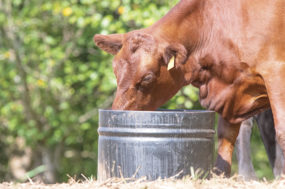The “Rebuilding The Beef Herd” program in Bastrop County is part of a statewide AgriLife Extension educational initiative. Registration for the May 3 program is $40 per person, including lunch.
To register, click here to go to AgriLife Extension's website and type “beef” into the keyword field.
“The reduced cow inventory combined with high input costs, competing uses for land, prices of competing meats and the radical changes in grain use are reshaping the beef business,” said Dr. Rick Machen, AgriLife Extension livestock specialist in Uvalde and program presenter.
“Those with serious intent to enter, rebuild or expand their operations can’t wait for rains and greener pastures. They need to develop a plan they can have in place when opportunity presents itself.”
Click here for more information on beef-herd rebuilding.
The May 3 program will begin at 8:30 a.m. with a general session featuring topics “Beef: Better (and Different) Times Ahead,” “Forage Recovery and Pasture Restocking” and “Evaluating Replacement Options.”
Lunch will be at noon, followed by the 1 p.m. presentation “Can a $2,500 Cow Break Even?” From 2:30 to 3:30 p.m., there will be two afternoon breakout sessions: one addressing flexibility in resource use and the other addressing leased grazing. These two sessions will be repeated from 3:30 to 4:30 p.m., with program adjournment at 5 p.m.
“Some beef-cattle producer challenges in this area include pasture management, such as waiting for drought-stricken forages to recover or replanting for more immediate results, determining proper restocking rates and timing, and deciding how much to spend on replacement cattle,” said Rachel Bauer, AgriLife Extension agent in Bastrop County.
“Producers will benefit from this program and get useful information they can apply to their operations.”
For the past two decades, there has been a continual decline in cattle numbers within the state, and the historic drought of 2011 has dramatically accentuated that trend, said Dr. Ron Gill, AgriLife Extension livestock specialist and associate department head for animal science at Texas A&M University, College Station.
Gill said recent surveys indicate that as many as 25 percent of producers who have sold cattle due to drought do not intend to go back into beef production, and another 10 percent to 15 percent indicate they may seek alternative livestock enterprises if they do go back into production.
“This will have long-term implications on the future of the Texas beef cattle industry,” he said. “The cattle industry brings billions of dollars to the state economy, but with the cowherd at such a critically low level, Texas will start to lose infrastructure if cow numbers do not increase soon.”
Gill said this and other programs being offered by AgriLife Extension throughout the state are intended to provide information producers need to adequately plan toward rebuilding their herd.
—From AgriLife Today news release
PHOTO:
Photo courtesy of Texas AgriLife Extension Service; photographer is Blair Fannin.






